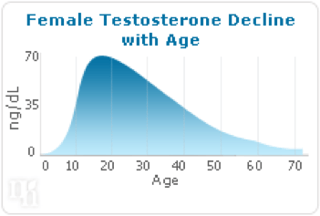Although normally related to men, testosterone is one of the many hormones that women have within their bodies, affecting them throughout their lives. “Normal” levels of testosterone vary from one woman to another, but experts suggest that the range of healthy testosterone levels is between 15 ng/dL – 85 ng/dL.
In this article, find out more about low, normal, and high testosterone levels, as well as a brief explanation of their effects on the female body.
Why Women Experience Low Testosterone
Low testosterone levels have been proven to have the potential to seriously impact female health and well-being.
Menopausal women are often prone to low testosterone levels; a forty-year-old woman, for example, has approximately half the testosterone of a twenty-year-old. On average, testosterone levels in females fall by as much as five percent per year beginning when they turn twenty.
When testosterone levels are low, women suffer bothersome symptoms. The main cause for low testosterone in women is the result of surgery, either for a hysterectomy or the removal of ovaries. Other reasons for low testosterone are not uncommon, however. These can include:
- Natural old age in conjunction with a drop in progesterone and estrogen levels
- High blood pressure
- Damage or disease in the pituitary or hypothalamus gland
- Infections (e.g., meningitis, mumps)
- Chemotherapy
- Morbid obesity
- Diabetes
Key Symptoms of Low Testosterone in Women
Clinical studies have shown that the main negative impact of low testosterone in women is a dangerous effect on their sexual health. The treatment for low testosterone can include sexual health supplements. Low testosterone doesn’t only affect sexual health; it also affects the general well-being of women. For this reason, it is important that knowledge of the symptoms of low testosterone be familiar to those who believe they may be suffering from low testosterone.
In addition to low libido and pain during sexual intercourse, other symptoms of low testosterone in women can show up as menopause-like issues, including irregular periods, vaginal dryness, and hot flashes. Low testosterone can also cause loss of muscle mass as well as weight gain, especially around the abdomen. As with other hormone issues like estrogen and progesterone deficiency, testosterone imbalance can lead to osteoporosis, cardiovascular disease, and depression.
Normal Testosterone Levels

Both excessively low and high testosterone levels can cause problems in the female body, which makes it essential to maintain normal levels of testosterone.
While there is no definitive “normal” amount of testosterone, experts agree that between 15 and 85 ng/dL is optimal. This might also vary according to age and health since hormone levels tend to decrease as women get older.
High Testosterone Levels
Although low testosterone levels are more common among menopausal women, high testosterone levels can also be problematic. Hormonal changes brought on by menopause may result in a surplus of testosterone.
Unusually high levels of testosterone can cause a variety of symptoms with age and menopause—hormonal levels tend to vary erratically, and for many women, the production of testosterone increases, resulting in excessively high testosterone levels.
Testosterone Imbalance
As with other important hormones, such as estrogen, high and low amounts of testosterone can greatly affect biological functions, causing a number of complications. A testosterone imbalance results when the amount of testosterone in the body fluctuates erratically.
Yes, Women Can Address Low Testosterone
The bottom line is, yes, women can have—and be impacted by—low levels of testosterone.
What experts now agree on is that both sexes need an adequate level of testosterone to maintain both physical and mental health. They now believe that low testosterone, not estrogen, is what leads to weight gain, fatigue, loss of mental focus and low libido in middle-aged women.
Most women will experience low testosterone levels before, during and after menopause. In fact, some women may start to see the symptoms of low testosterone in their early 30’s. These symptoms include low libido, hot flashes, fatigue, mental fogginess and weight gain.
Testosterone and other related hormones (DHEA and DHEAS) in the body (also known as androgens) have known physiological roles in women. Firstly, estrogen is made from testosterone and DHEA, and without the ability of our bodies to produce testosterone we cannot produce estrogen. Testosterone and DHEA appear to have direct independent effects in different parts of the body, and some women may experience a variety of physical symptoms when their blood levels fall. Such symptoms may include:
-
Impaired sexual interest (loss of libido or sexual desire), and lessened sexual responsiveness
-
Lessened wellbeing, loss of energy
Testosterone therapy may be beneficial for some women who have had their ovaries surgically removed or in some who have significant symptoms in the form of loss of libido, fatigue and diminished wellbeing.
The causes of a testosterone imbalance vary depending on the age of the woman. However, it is important to maintain healthy levels of testosterone at every age.
Contact us if you'd like to learn more about testosterone therapy for women.
Read next in Women’s Health

How Weight Loss Impacts Women’s Health
By Dr. Robb Bird

How Menopause Hormones Can Influence Weight Gain and Ways to Manage It
By Dr. Robb Bird

Hormone & Peptide Therapy for Menopause Symptoms Beyond Estrogen | TransformYou
By Dr. Robb Bird
Medically reviewed by Dr. Robb Bird, NMD FAARM
Medical Director, Transformyou
.jpg)